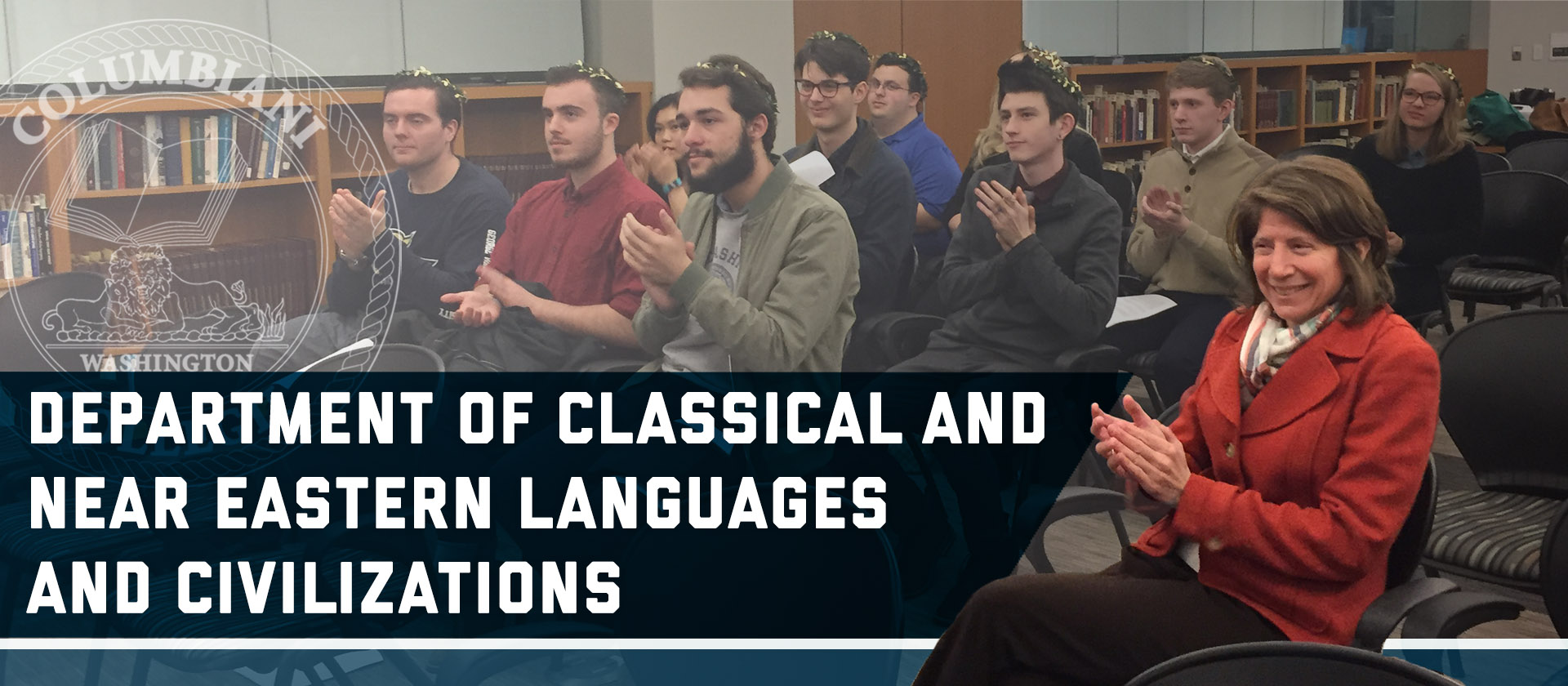2025 CNELC Newsletter

Message From the Chair
Department Spotlights
Faculty Kudos
Alumni Class Notes
Message From the Chair

The Department of Classical and Near Eastern Languages and Civilizations (CNELC) sends along its warmest greetings and kind regards to all of our alums near and far!
As you know, our department is a broad, diverse and yet cohesive set of program units, with languages as one of the core components of our departmental curriculum. During recent years, our department has consisted of four program units: Classical and Ancient Near Eastern Studies, Arabic, Hebrew and Persian. We are pleased to announce that we have recently augmented our offerings with a fifth program unit, namely, Uyghur.
The teaching of Uyghur at GW came about because of a generous endowment gift from an alum for that very purpose. Moreover, incorporating the Uyghur language courses into our department here at CNELC came about because of its natural fit. After all, the Arabic script is normally used for writing Uyghur (and we have long had a strong program in Arabic), and Uyghur is a Turkic language (and historically we have sometimes offered Turkish in our department).
We began offering Beginning Uyghur in fall 2024, and this year-long course is continuing in spring 2025. In addition, since the funding for Uyghur is from an endowment, we are confident that Uyghur languages will be offered in our department in perpetuity. Now, therefore, CNELC consists of five program units!
As you know, our department is a vibrant one, in terms of teaching, service and research within the academic guild. In terms of teaching, every semester we have a few hundred students in CNELC courses (across the five program units). In other words, the study of ancient languages and civilizations is thriving in the CNELC Department.
Within this newsletter, you will read about some of the faculty and student activities and achievements of this past year, and we intend to continue to build on these for the coming year. We are grateful that you are taking the time to read this newsletter and we would love to hear from you. Please send us a note and let us know how you are doing!
Christopher Rollston
Chair, Department of Classical and Near Eastern Languages and Civilizations
Department Spotlights

CNELC Expands: Uyghur Language Now Permanent Program Unit
Last year, the Classical and Ancient Near Eastern Languages and Civilizations Department added Uyghur as its fifth program unit, alongside Classical and Ancient Near Eastern Studies, Arabic, Hebrew and Persian. We are pleased to serve as the permanent home for Uyghur at GW.
Uyghur is a Turkic language written in a Perso-Arabic script. It is spoken by over 12 million people in Xinjiang, China, along with Central Asia and global Uyghur communities. In 2023, GW became one of the few U.S. universities to offer Uyghur courses, and, in 2024, Uyghur became a formal part of CNELC.
We offer Beginning and Intermediate Uyghur (UYGR 1001–2002) and a graduate-level Uyghur Language and Translation course (UYGR 6001). We welcome all students interested in learning Uyghur at CNELC!

Honoring the Legacy of Diane Harris Cline
Last year, the Diane Harris Cline Memorial Prize for Classics and History was established to honor the life and impact of Diane Harris Cline, a beloved professor of classics and history at GW. Known for her interdisciplinary research and dedication to teaching, she inspired countless students with her passion for the ancient world and digital humanities.
The Columbian College of Arts and Sciences created the Cline Memorial Fund to support student research in classics and history, ensuring her legacy continues to shape future scholars.
Her contributions and the memorial prize were featured in the CCAS Spotlight newsmagazine.
Faculty Kudos
- Professor Eric Cline was awarded a Fulbright Senior Scholar fellowship for spring 2025 to conduct research at the University of Haifa for his upcoming book. This year, he also received the GW OVPR Career Award; co-edited Excavations at Tel Kabri III; and published two new books: After 1177 B.C.: The Survival of Civilizations and 1177 B.C.: A Graphic Version of The Year Civilization Collapsed (both released on April 16 by Princeton University Press).
- During winter break 2025, Professor Mohssen Esseesy, director of the Arabic program, led a 10-day study program in Oman as part of the Oman: Business and Cultural Exploration course. Students visited 10 major corporations, the U.S. Embassy and key cultural sites, including a treasure hunt at Mutrah Souq with Omani students, excursions to Nizwa Fort and Jabreen Castle, a wilderness safari in Wahiba Sands and a Dhow cruise.
- Over the past few months, Professor Christopher Rollston has been widely cited in major publications. He was quoted in Christianity Today (Feb 2025) on an ancient church floor arriving in the U.S.; in The New York Times and The Times of Israel (Jan 2025) on the Ten Commandments tablet auction and the origins of the earliest alphabet; and in Scientific American (Dec 2024) on the discovery of what may be the world’s oldest alphabet.
- Professor Orian Zakai, coordinator of the Hebrew program, published her first Hebrew novel, Sugar Crash (Nefilat Sukar), a story of friendship, loss, escape and the search for home in an increasingly fragmented world.
Alumni Class Notes
- Alexandra Donaldson, BA ’21, received her Juris Doctor from the University of New Hampshire Franklin Pierce School of Law in May 2024. She currently works as a judge advocate in the United States Coast Guard.
- Ricky Gibbons, BA ’68, taught German language and culture to soldiers newly arrived in Germany. She was a translator for German and English at the Paris and London Air Shows. She lived in Europe for 34 years with a house in Italy for 21 years. She retired in Winchester.
- Nikita Vivekanandan, BS ’21, works at the United States Department of Agriculture as a nutrition program manager.

